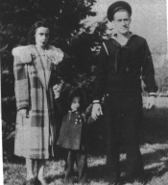


The war didn't really affect me personally. The only thing is I missed my husband. But it wasn't any hardship. I made the most of it. I had his mother and father to fall back on. The war wasn't really that big a part of my life.
Edna Bitgood stayed home during the war and took care of her two daughters while her husband Irving was in the South Pacific. She was quiet and reserved during the interview, relying on many of her husband's recollections. She has always lived in Hopkinton.
We were home that Sunday. My father and mother had come to visit us. They wanted to see the baby, Florence, and had brought her a pretty little dress as a gift. We were all there when they announced that Pearl Harbor had been bombed, and that we were going into war.
Everyone was surprised. I hadn't had any sense that we might be going into war, not until the President announced it, that is. I wasn't mad at the President, though.
Before the war my husband Irving worked at the Hamilton Propeller Plant in Westerly, but when he heard that a lot of his buddies were going into service, he wanted to go also.
In the meantime I found out that I was pregnant again. But he still went into the Navy. He had to go to Newport, and from there to Melville for training on the PT boats. Irving would come home every other weekend. Right before he was shipped to California I had our second daughter Barbara.
I used to write to Irving every night, faithfully (See Writing Letters... ). And he wrote to me. Course, his letters were censored. A lot of times things were cut out that I wasn't supposed to know. We had a code between the two of us so that I would know where he was. We had a friend named Pearl, and he asked me in a letter, "How is Pearl doing?" Right away I knew where he was. Of course it was hard reading the censored letters, but when he got back he told me most of the things that were missing.
Was it hard, having your husband gone, and having to take care of two small children alone?
Yes, it was hard, but I did my best. I had Irving's father and mother living upstairs, and when I needed something they were there. It really helped out a lot having them there.
There was rationing of course. I never had any real problems with that though. I had more than enough stamps with only me and two small girls. I gave my extra stamps to people who needed them. I couldn't really go anywhere because of gas rationing, but I didn't get sick of being at home.
My work around the house changed. We had a stove in the kitchen which used oil kept in the black jug that was on the back of the stove. I used to have to fill that. In the living room I burned coal. I would start that fire up in the fall, and that coal fire would not go out until spring. I knew just how to work it. I had to bring in the pot of coal of course.
I didn't really do anything towards the war effort. There was the servicemen's wives club, though, that we service wives started up. We had a meeting once a month, and made corsages for the March of Dimes. They were very pretty. We sold them to make money. We were going to have a dance like the USO (United Servicemen's Organization) had, but that fell through because some of the women that were in the club thought that it was too risky for wives to be running something like that. They didn't think it was proper so we didn't do it.
There was such happiness when the war ended. On the day when Hiroshima was bombed we all knew that something drastic was going to happen with the bomb, so we were all listening to the radio. We had a regular block party. I can remember we were all out standing in the road, and talking, and having such a good time. I went into the house and just let myself go. I bawled my eyes out. God, it was such a good feeling to know that it was ended and that the soldiers were coming home.
Irving came home right after the war. He and 3,000 other men landed in California. He flew to Boston, and from there took the train to Westerly. By that time I had my license to drive the car, and I went right down to the train station and picked him up and brought him home. Our daughters were glad to have their daddy back. While he was gone I had hung a picture of him in the living room so they'd know who he was.
Before the war Irving and I had had plans to build a house. After the war we were finally able to build one in Hope Valley. I saved every cent during the war so when he got out of the service we could start building it. And we did.
Copyright 1995